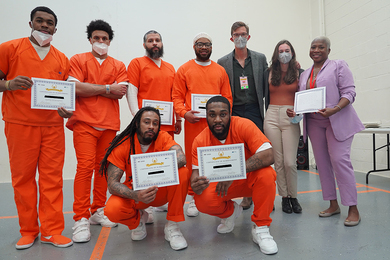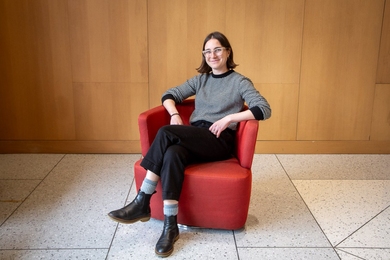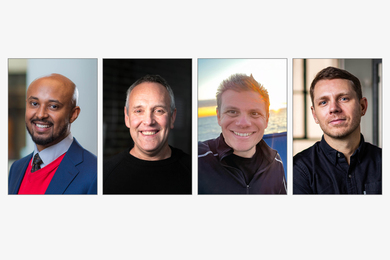Sweatshirts and caps featuring university logos symbolize more than the powers of style and sentiment, according to Dara O'Rourke, assistant professor of urban studies and planning. These items can also reflect a new role in the global marketplace for universities.
In recent research, Professor O'Rourke audited conditions under which university-licensed apparel is manufactured and also suggested steps that universities can take to improve labor and environmental conditions in countries including China, El Salvador, Mexico, Pakistan, South Korea, Thailand and the United States.
"Universities, with their capacity for gathering and analyzing information, are uniquely positioned to play a central role in opening up the apparel industry to greater public examination," said Professor O'Rourke, who has visited sweatshops and factories throughout the developing world.
The research was initiated jointly among five NCAA Division I universities -- Harvard, the University of Michigan, Notre Dame, Ohio State and the University of California -- in collaboration with Professor O'Rourke, the Business for Social Responsibility Education Fund (BSREF) and the Investor Responsibility Research Center (IRRC). MIT was not a participant.
The Independent University Initiative, as the collaborative report was called, reflects a historic convergence of interests among universities, activists and multinational corporations such as Nike, Reebok, Disney and the Gap, Professor O'Rourke said. Its final report, completed in October 2000, is available on the web.
While sweatshirts and other items with university logos are big business -- University of Michigan apparel brought in $200 million last year alone, Professor O'Rourke noted -- universities themselves are under intense pressure from students and alumni to apply standards of transparency and accountability to all their investments.
At the same time, multinational corporations, jealously guarding their brand-name market share, have become more willing to allow auditing of labor and other conditions among subcontractors in the developing world.
"Media expos�s of child labor or toxic production processes create bad public relations. There is increasing awareness of these conditions amongst the general public. Nobody wants to buy sweatshop clothes or a toy for their child that was made by a child," said Professor O'Rourke.
Professor O'Rourke also sees a change in activists' strategies and goals. Gone are the days of simple boycotts, he said. Campaigns to abolish sweatshops and hazardous jobs in factories are now international in scope and involve sophisticated auditing of labor conditions and identifying and sanctioning both bad and good practices.
"Developing countries need these jobs. In China I saw hundreds of women lined up to work in a New Balance factory; people want these jobs. But that's no excuse for paying below the legal minimum wage or poisoning workers. It's no excuse for using benzene, a known carcinogen, without protections. Sophisticated activists don't call for boycotts that might hurt workers -- they don't want brand names to just cut contracts and close factories and go someplace else.
"Now transnational activists use information deployment, e-mail, the Internet and the media to publicly embarrass firms and governments, and to build new regulatory strategies across borders. They use networked pressure to get firms to make better decisions on behalf of workers' human rights," he said.
MONITORING THE MONITORS
Professor O'Rourke's role in the Independent University Initiative (IUI) was to accompany Pricewater-houseCoopers monitors as they inspected conditions in factories subcontracted by corporations licensed to produce university-logo goods such as T-shirts and sweat-shirts. He discovered significant disparities between what the Pricewaterhouse-Coopers auditors found and what the IUI team found.
Overall, the IUI team found subpar working conditions, underenforcement of labor standards, insufficient awareness and monitoring of codes of conduct, wage and overtime violations, discrimination against women, widespread health and safety problems, and increased subcontracting to smaller and harder-to-find sites, including workers' homes.
GUARDED OPTIMISM
Despite the often depressing sights he has seen, Professor O'Rourke's numerous factory visits and his personal experiences in factories in the developing world have given rise to a guarded optimism about monitoring and improving labor conditions globally, especially where universities are concerned.
For one thing, he said, these new reports are the first to have been made public. Previously, audits were conducted in secret. For another, it was clear that some of the countries the IUI team visited had commendable factory practices and that efforts to monitor practices were underway.
In the IUI report, Professor O'Rourke noted, "Universities can play different roles [in contributing to improvements] -- as licensors; as teachers; as researchers in social, political and economic processes; as resources in policy development; and as catalysts for the generation of ideas."
On a personal note, Professor O'Rourke added that he was inspired to continue his research by the examples of workers and activists as well as by academics.
"One of the things that really has continued to inspire me is meeting workers in the factories I inspect and activists in the countries I study. The phrase I have heard many times from Vietnamese workers for instance, is, "We just want to be treated like human beings." This simple demand seems to me something worth struggling for, and something worth doing research on.
"There is obviously a huge amount of work still to be done on the social, environmental and labor impacts of global production and globalization. It is critical to keep those most severely impacted -- the workers at the bottom of our supply chains -- firmly in our sights as we do this research," he said.
MIT faculty have also inspired Professor O'Rourke. "Noam Chomsky, Josh Cohen, Louis Kampf and other professors really opened up whole new worlds of thinking for me as an undergraduate," said Professor O'Rourke (SB 1989, mechanical engineering).
A version of this article appeared in MIT Tech Talk on December 13, 2000.





